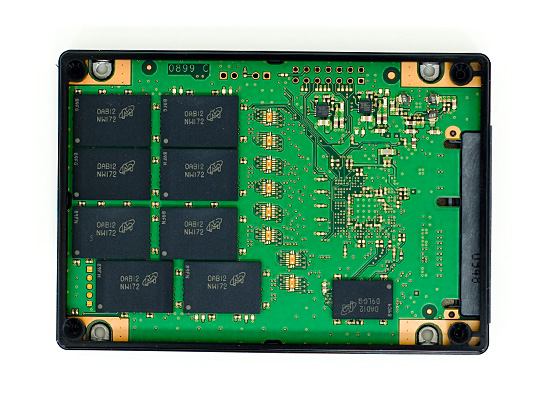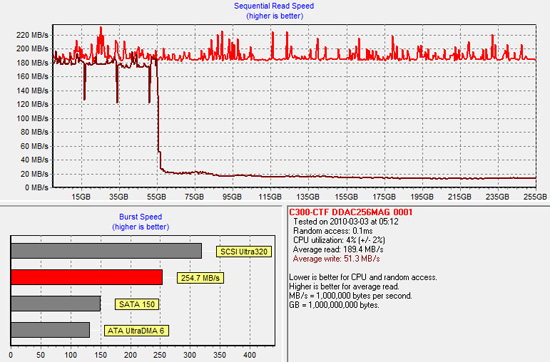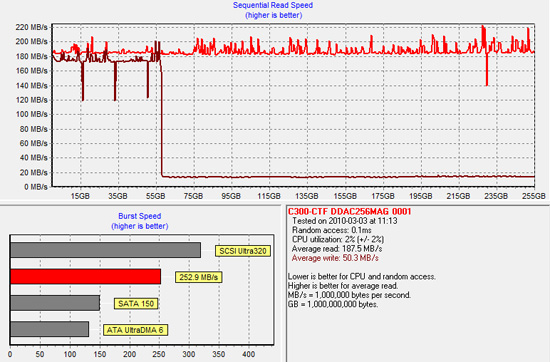Crucial's RealSSD C300: An Update on My Drive
by Anand Lal Shimpi on March 25, 2010 1:28 PM EST- Posted in
- Storage
Earlier this morning I published an article looking into the performance of 6Gbps SATA controllers, both integrated and off-chip. In it I mentioned my recently deceased Crucial RealSSD C300 that decided to up and stop working one day. Given that Crucial is selling these drives, I wasn't too happy with the outcome.

Inside Crucial's RealSSD C300
The drive would not longer be detected on POST. In fact, with the C300 connected to any machine I couldn't get any OS to boot; the system would just hang at drive detection. After a couple of weeks of toying with my dead drive, Crucial came back to me with an explanation of what's going on.
"We determined that the drive wasn’t bricked, but that it was very slow at powering up due to errors in the firmware tables that resulted in the characteristics you were seeing. We’re still investigating these errors."
I still don't know why the firmware tables developed errors, but presumably if your drive has found its way into this state then your data should still be intact. Now the second problem.
When I got my replacement drive I wanted to see how well the C300's TRIM function was implemented. I'd recently run into a couple of SSDs that don't appear to recover well after used LBAs are TRIMed. Unfortunately, the C300 joined the list. Here's a look at a sequential write across the entire 256GB C300 after I've peppered it with random writes:

Write performance does not look good. While parts of the drive can still write at around 180MB/s, the last 60GB of the drive are limited to about 20MB/s. A quick format across the drive should invoke the TRIM instruction for all LBAs and tell the C300 that it none of the data on the drive is needed and those blocks can be recycled immediately. Performance should restore to new (constant ~200MB/s across all LBAs). Unfortunately, it doesn't:

In fact, performance got worse. Let's TRIM the drive once more for good measure:

Ouch. The drive won't come back, period. The only way to restore it to full performance is to perform a secure erase. Now this scenario is a corner case and it's not one I'd expect any desktop user to run into in a short period of time. However, it is possible that after several months or years your drive might find itself in a situation where its performance never recovers. Crucial's response to the issue is below:
"...we have been able to replicate the circumstances where performance after a format does not return to acceptable levels, and we have developed a solution. We plan to integrate this into our production line and we’ll make it available to current customers. We’ll send you the code after it’s been thoroughly tested.
As we’ve mentioned before, we perform thousands of hours of testing before going into production. And as you’ve shared in one of your articles, testing every single combination of hardware, software and usage is highly improbable. We really appreciate all the feedback you have provided, as it allows us to make sure that our ongoing product improvements and updates are as comprehensive as possible."
Despite Crucial's promises of doing a ton of validation, things like this do get through. It's not a problem specific to Crucial, remember that Intel had a similar situation crop up in its early X25-M days. This isn't the first SSD to fail on me either. It's because of problems like these that I recommend waiting before jumping on any new, unproven SSD. Just a heads up in case you're thinking about making the jump anytime soon. If you are interested in how the C300 performs, take a look at its results in our new SSD Bench database.










49 Comments
View All Comments
ClagMaster - Saturday, April 3, 2010 - link
If true, this is unacceptable.For such devices of such obvious long term significance to the industry, I am shocked the SSD manufactures are NOT taking ownership of the firmware of their SSD products seriously by maintaining staffs that write and are accountable for the firmware and utilites for their SSD products.
This tells me that compared to hard-drives, the SSD is still a rinky-dink development that need careful scrutiny before adoption. To me this situation is unacceptable. I only buy from manufacturers who take long-term stewardship of their products.
Since Intel maintains a staff of competent programmers who write and take ownership of their SSD firmware, and the other vendors (excluding perhaps OCZ) do not, I now know which manufacturer I am going to purchase SSD's from -- Intel. Sure is not going to be Crucial or Mushkin.
@Mr Shimpi
Would you please provide a list of SSD vendors who maintain staffs who write firmware for their SSD's products to assist us in making better informed purchases. Crucials response to your C300 issue is unacceptable hardly inspires confidence?
glpdx - Thursday, March 25, 2010 - link
Andand,I was very close to purchasing the 128GB model of the S300, but then saw data that it's write performance is MUCH less than the 256GB version, enough so that I don't think it could be considered a top contender. These specs are stated right on Crucial's Data Sheet. Any chance you'll get your hands on a 128GB? Thanks for your reviews. ~g
beginner99 - Thursday, March 25, 2010 - link
Yeah they do ultra extrem testing but miss that trim does not work. Sounds like pr-cr.. to me.It's like saying we really tested this car well in many possible situations but the hand break does not work yet.
Seems more and more like in software. well the most important part of an ssd is software, hm...
blowfish - Thursday, March 25, 2010 - link
Anand, you ought to write a book!kmmatney - Thursday, March 25, 2010 - link
I think you'll run into the TRIM problem on these drives fairly soon, rather than a several months or years. If I'm understanding it correctly, getting the drive "full" has nothing to do with the free space on the drive - but rather how much data has been written to the drive, even if you later delete it. So all the random writes that windows performs in nomral use will all count towards the drive being "full" - isn't that correct?Mr Perfect - Thursday, March 25, 2010 - link
Sounds right to me. The wearleveling should have every cell written to before re-using cells, even if it's just temp data being written.kmshark - Thursday, March 25, 2010 - link
Anand, how did you test if TRIM isn't working properly? Did you have to do the "secure erase"? Is that a crucial utility? It would be great to get a summary of the SSDs that have failed on you and why.I recently purchased a summit 2 for my laptop and two X-18m drives to raid in my main system. Feeling more like an "early adopter" as I read more about SSDs that just die.. thought that when they crapped out they would still be accessile.
Voo - Thursday, March 25, 2010 - link
Every disk can fail so if "drives just die" is an assessment for "early adpopting" than everyone who buys a HDD is one ;)And secure erase just writes data to the complete disk, so that's nothing special from Crucial
kmshark - Thursday, March 25, 2010 - link
Part of the selling point for SSDs is the reliability.. I can't remember a HDD that died on me without some warning.. I've had many with issues, but you see the warning signs if you're using the system regularly and can do something about it...I just feel like the number of reports of bricked SSDs with no answer to why, is too high.. that may not be the case and maybe 99% of them don't die.. would be great to get Anandtech's experience with them to see what percentage of theirs had to be returned. It's hard to go by Newegg reviews because you don't know how many were sold vs the good/bad reviews.
Silly me, not knowing about secure erase... I assume everyone without TRIM or a vendor-supplied wiping tool uses it to refresh their drive.
Voo - Friday, March 26, 2010 - link
Well seems like you got lucky, there are many cases where HDDs just die without any of the usual warnings - and yes I do zerofill my drives before using them so I usually get those drives that would fail after some weeks.Cost per GB is on a alltime low, so backuping really shouldn't be a problem. Maybe SSDs have a higher failure rate (I doubt it, but maybe I'm visiting the wrong forums), that's inconvenient if it happens, but they're still great if they work and I haven't had a problem with my Intel G2 so far (woha one drive! great statistic I know ;) )